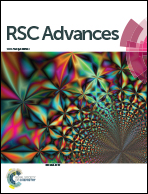Biological macromolecule cross linked TPP–chitosan complex: a novel nanohybrid for improved ovulatory activity against PCOS treatment in female rats†
Abstract
Polycystic ovary syndrome (PCOS) is a relatively common endocrine disorder among young women and leads to metabolic problems associated with the onset of infertility. The present study was emphasized to investigate the protective role of biomolecule coated sodium tripolyphoshate–chitosan nanocomplexes (CNPs) by improving the ovulatory function and gonadotropic hormonal level changes in estradiol valerate (EV) induced PCOS female rats. Fabrication of biomolecule-loaded sodium tripolyphosphate cross-linked chitosan nanocomplex (CNP) by ionic gelation method using methanolic extracts of G. sylvestre leaves (GSLE) and C. zeylanicum (CZBE) barks was achieved and the synthesized GSCNPs and CZCNPs were characterized by FTIR, XRD, TEM and DLS. The protective effects of the synthesized nanocomplex against PCOS induced rats were proved with biochemical and histopathological analysis. Biomarkers essential for ovarian function, serum follicle stimulating hormone (FSH); luteinizing hormone (LH); prolactin (PRL); progesterone (PRG) and insulin (INS) levels were determined. The biomolecule-loaded chitosan nanoparticles treatment was significantly increased the follicle stimulating hormone and progesterone level while decreased significantly the luteinizing hormone, prolactin and insulin level in PCOS animal versus control. Histopathology results confirmed that the development poly cysts in the ovary containing atretic follicles with irregular estrous cycles were noticed in estradiol valerate induced rats. Further, it also enhanced the attenuated layer of granulosa cells in the cyst and destroyed oocytes when compared with the control. In conclusion, the present results suggested that the biomolecule-loaded chitosan nanoparticle (CNPs) treatment could revert estrous cycle back to normal in PCOS induced rats.


 Please wait while we load your content...
Please wait while we load your content...